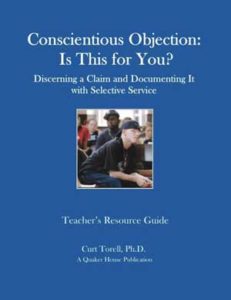Conscientious Objection: Is This for You? Discerning a Claim and Documenting It with Selective Service
Reviewed by J. E. McNeil
November 1, 2017
 By Curt Torell. Quaker House of Fayetteville, N.C., 2016. 209 pages. $15/paperback.
By Curt Torell. Quaker House of Fayetteville, N.C., 2016. 209 pages. $15/paperback.
Buy from QuakerBooks
This book is a niche book, but Quaker meetings and schools make up a large part of its niche.
It is a “teacher’s resource guide” to help young people create documentation for a conscientious objection application for a military draft. One concept that drives such programs is that if there is a draft, the first wave of potential inductees may have as few as nine days to provide viable documentation to support an application to be recognized as a conscientious objector (CO)
This, of course, assumes that there is actual potential for a draft. There is no real reason to believe that the likelihood of a draft has changed significantly in the past few years. The military leadership is the group least interested in a draft, since it is not cost effective to train someone for a two-year stint. Further, where one report says the military is struggling to recruit (even while noting that for decades the military has met its goals), another report says it will meet its goals (after struggling for years).
Torell, a member of the board of Quaker House of Fayetteville, N.C., fortunately includes in this book an excellent summary of the long-range benefit of confronting conscientious objection whether there is a draft or not. Torell does a good job helping youth leaders and young people both understand conscientious objection to war and why, with or without a draft, we should care. Quaker House, which has been located near a major U.S. Army training base at Fort Bragg for decades, gives a chilling but accurate glimpse of what military training is about, as well as goes through the process of creating the documentation of a conscientious objector file.
The two best parts of the book to me, as someone who has done hundreds of these trainings over the years, is the history of the draft and conscientious objection law and the summary of long-range benefits of writing a CO letter. The biggest lack in the book is there was really no discussion of the racism in the military, which, to me, is something that goes hand-in-glove with conscientious objection to war. The young people of color among Friends are likely to have a more difficult time obtaining a CO designation, even as people of color in the military have a harder time receiving a CO discharge.
Of course, there are always liberal military apologists (even among Friends) who claim in spite of facts to the contrary that a military draft will result in fewer wars (even though we had a draft before WWII, Korea, and Vietnam) and a fairer burden (even though disproportionately fewer poor men and people of color received a medical deferment in every war in which we had a military draft). Then the apologists usually top off that suggestion with the idea that, anyway, a military draft (which promotes other people’s children to die) will help our children think deeply about war and conscientious objection.
I recommend that any First-day program or yearly meeting youth program consider using this curriculum (or ask Quaker House, American Friends Service Committee, or the Center on Conscience & War to give a training) to help their youth grapple with these ideas that are so fundamental to so many Friends. It is our responsibility, not Congress’s, to help our young people deeply understand just why Friends keep saying, “War is not the answer.”



Comments on Friendsjournal.org may be used in the Forum of the print magazine and may be edited for length and clarity.